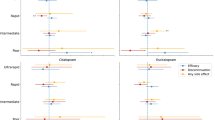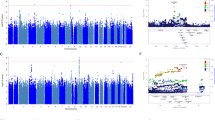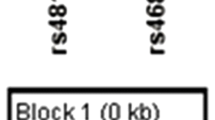Abstract
We applied a systematic pharmacogenetic approach to investigate the role of genetic variation in the gene encoding catechol O-methyltransferase (COMT) in individual variation in selective serotonin reuptake inhibitor (SSRI) response among depressed patients. In all, 23 single-nucleotide polymorphisms (SNPs) in COMT were genotyped using DNA from the Sequenced Treatment Alternatives to Relieve Depression (STAR*D) study (N=1914). One SNP, rs13306278, located in the distal promoter region of COMT, showed significant association with remission in White non-Hispanic (WNH) subjects (P=0.038). Electromobility shift assay for rs13306278 showed alternation in the ability of the variant sequence to bind nuclear proteins. A replication study was performed using samples from the Mayo Clinic Pharmacogenetics Research Network Citalopram/Escitalopram Pharmacogenomic study (N=422) that demonstrated a similar trend for association. Our findings suggest that novel genetic markers in the COMT distal promoter may influence SSRI response phenotypes.
This is a preview of subscription content, access via your institution
Access options
Subscribe to this journal
Receive 6 print issues and online access
$259.00 per year
only $43.17 per issue
Buy this article
- Purchase on Springer Link
- Instant access to full article PDF
Prices may be subject to local taxes which are calculated during checkout


Similar content being viewed by others
References
Kessler RC, Berglund P, Demler O, Jin R, Koretz D, Merikangas KR et al. The epidemiology of major depressive disorder: results from the National comorbidity survey replication (NCS-R). JAMA 2003; 289: 3095–3105.
Preskorn S, Stanga C, Feighner J, Ross R (eds) Antidepressants: Past, Present and Future. Springer Verlag, Berlin, Heidelburg, New York, 2004 p 242.
Rang HD, Dale MM, Ritter JM . Pharmacology. 4th edn. Churchill Livingstone, 1999 p 830.
Schildkraut JJ . The catecholamine hypothesis of affective disorders: a review of supporting evidence. Am J Psychiatry 1965; 122: 509–522.
Axelrod J, Tomchick R . Enzymatic O-methylation of epinephrine and other catechols. J Biol Chem 1958; 233: 702–705.
Grossman MH, Creveling CR, Breakefield XO . Isolation of the mRNA encoding rat liver catechol-O-methyltransferase. Biochem Biophys Res Commun 1989; 158: 776–782.
Grossman MH, Emanuel BS, Budarf ML . Chromosomal mapping of the human catechol-O-methyltransferase gene to 22q11.1----q11.2. Genomics 1992; 12: 822–825.
Badner JA, Gershon ES . Meta-analysis of whole-genome linkage scans of bipolar disorder and schizophrenia. Mol Psychiatry 2002; 7: 405–411.
Lundstrom K, Tenhunen J, Tilgmann C, Karhunen T, Panula P, Ulmanen I . Cloning, expression and structure of catechol-O-methyltransferase. Biochim Biophys Acta 1995; 1251: 1–10.
Tenhunen J, Salminen M, Lundstrom K, Kiviluoto T, Savolainen R, Ulmanen I . Genomic organization of the human catechol O-methyltransferase gene and its expression from two distinct promoters. Eur J Biochem 1994; 223: 1049–1059.
Weinshilboum RM . Pharmacogenomics: catechol O-methyltransferase to thiopurine S-methyltransferase. Cell Mol Neurobiol 2006; 26: 539–561.
Weinshilboum RM, Raymond FA . Inheritance of low erythrocyte catechol-o-methyltransferase activity in man. Am J Hum Genet 1977; 29: 125–135.
Scanlon PD, Raymond FA, Weinshilboum RM . Catechol-O-methyltransferase: thermolabile enzyme in erythrocytes of subjects homozygous for allele for low activity. Science 1979; 203: 63–65.
Spielman RS, Weinshilboum RM . Genetics of red cell COMT activity: analysis of thermal stability and family data. Am J Med Genet 1981; 10: 279–290.
Lachman HM, Papolos DF, Saito T, Yu YM, Szumlanski CL, Weinshilboum RM . Human catechol-O-methyltransferase pharmacogenetics: description of a functional polymorphism and its potential application to neuropsychiatric disorders. Pharmacogenetics 1996; 6: 243–250.
Craddock N, Owen MJ, O′Donovan MC . The catechol-O-methyl transferase (COMT) gene as a candidate for psychiatric phenotypes: evidence and lessons. Mol Psychiatry 2006; 11: 446–458.
Goodman JE, Lavigne JA, Hengstler JG, Tanner B, Helzlsouer KJ, Yager JD . Catechol-O-methyltransferase polymorphism is not associated with ovarian cancer risk. Cancer Epidemiol Biomarkers Prev 2000; 9: 1373–1376.
Millikan RC, Pittman GS, Tse CK, Duell E, Newman B, Savitz D et al. Catechol-O-methyltransferase and breast cancer risk. Carcinogenesis 1998; 19: 1943–1947.
Thompson PA, Shields PG, Freudenheim JL, Stone A, Vena JE, Marshall JR et al. Genetic polymorphisms in catechol-O-methyltransferase, menopausal status, and breast cancer risk. Cancer Res 1998; 58: 2107–2110.
Ji Y, Olson J, Zhang J, Hildebrandt M, Wang L, Ingle J et al. Breast cancer risk reduction and membrane-bound catechol O-methyltransferase genetic polymorphisms. Cancer Res 2008; 68: 5997–6005.
Zhang J, Ji Y, Moon I, Pelleymounter LL, Salavaggione OE, Wu Y et al. Catechol O-methyltransferase pharmacogenomics: human liver genotype-phenotype correlation and proximal promoter studies. Pharmacogenet Genomics 2009; 19: 577–587.
Shield AJ, Thomae BA, Eckloff BW, Wieben ED, Weinshilboum RM . Human catechol O-methyltransferase genetic variation: gene resequencing and functional characterization of variant allozymes. Mol Psychiatry 2004; 9: 151–160.
Howland RH . Sequenced Treatment Alternatives to Relieve Depression (STAR*D). Part 2: Study outcomes. J Psychosoc Nurs Ment Health Serv 2008; 46: 21–24.
Zisook S, Ganadjian K, Moutier C, Prather R, Rao S . Sequenced Treatment Alternatives to Relieve Depression (STAR*D): lessons learned. J Clin Psychiatry 2008; 69: 1184–1185.
Trivedi MH, Rush AJ, Wisniewski SR, Nierenberg AA, Warden D, Ritz L et al. Evaluation of outcomes with citalopram for depression using measurement-based care in STAR*D: implications for clinical practice. Am J Psychiatry 2006; 163: 28–40.
Mrazek DA, Rush AJ, Biernacka JM, O’Kane DJ, Cunningham JM, Wieben ED et al. SLC6A4 variation and citalopram response. Am J Med Genet B Neuropsychiatr Genet 2008; 150B: 341–351.
Stram DO, Haiman CA, Hirschhorn JN, Altshuler D, Kolonel LN, Henderson BE et al. Choosing haplotype-tagging SNPS based on unphased genotype data using a preliminary sample of unrelated subjects with an example from the Multiethnic Cohort Study. Hum Hered 2003; 55: 27–36.
Carlson CS, Eberle MA, Rieder MJ, Yi Q, Kruglyak L, Nickerson DA . Selecting a maximally informative set of single-nucleotide polymorphisms for association analyses using linkage disequilibrium. Am J Hum Genet 2004; 74: 106–120.
Nackley AG, Shabalina SA, Tchivileva IE, Satterfield K, Korchynskyi O, Makarov SS et al. Human catechol-O-methyltransferase haplotypes modulate protein expression by altering mRNA secondary structure. Science 2006; 314: 1930–1933.
Shifman S, Bronstein M, Sternfeld M, Pisante-Shalom A, Lev-Lehman E, Weizman A et al. A highly significant association between a COMT haplotype and schizophrenia. Am J Hum Genet 2002; 71: 1296–1302.
Peters EJ, Slager SL, Kraft JB, Jenkins GD, Reinalda MS, McGrath PJ et al. Pharmacokinetic genes do not influence response or tolerance to citalopram in the STAR*D sample. PLoS ONE 2008; 3: e1872.
Kaakkola S, Gordin A, Mannisto PT . General properties and clinical possibilities of new selective inhibitors of catechol O-methyltransferase. Gen Pharmacol 1994; 25: 813–824.
Loots GG, Ovcharenko I, Pachter L, Dubchak I, Rubin EM . rVista for comparative sequence-based discovery of functional transcription factor binding sites. Genome Res 2002; 12: 832–839.
Loots GG, Locksley RM, Blankespoor CM, Wang ZE, Miller W, Rubin EM et al. Identification of a coordinate regulator of interleukins 4, 13, and 5 by cross-species sequence comparisons. Science 2000; 288: 136–140.
Grabe N . AliBaba2: context specific identification of transcription factor binding sites. In Silico Biol 2002; 2: S1–15.
Landschulz WH, Johnson PF, Adashi EY, Graves BJ, McKnight SL . Isolation of a recombinant copy of the gene encoding C/EBP. Genes Dev 1988; 2: 786–800.
Birkenmeier EH, Gwynn B, Howard S, Jerry J, Gordon JI, Landschulz WH et al. Tissue-specific expression, developmental regulation, and genetic mapping of the gene encoding CCAAT/enhancer binding protein. Genes Dev 1989; 3: 1146–1156.
Thase ME, Haight BR, Richard N, Rockett CB, Mitton M, Modell JG et al. Remission rates following antidepressant therapy with bupropion or selective serotonin reuptake inhibitors: a meta-analysis of original data from 7 randomized controlled trials. J Clin Psychiatry 2005; 66: 974–981.
Serretti A, Artioli P . The pharmacogenomics of selective serotonin reuptake inhibitors. Pharmacogenomics J 2004; 4: 233–244.
Kirchheiner J, Nickchen K, Bauer M, Wong ML, Licinio J, Roots I et al. Pharmacogenetics of antidepressants and antipsychotics: the contribution of allelic variations to the phenotype of drug response. Mol Psychiatry 2004; 9: 442–473.
Kato M, Serretti A . Review and meta-analysis of antidepressant pharmacogenetic findings in major depressive disorder. Mol Psychiatry 2008; 15: 473–500.
Peters EJ, Slager SL, Jenkins GD, Reinalda MS, Garriock HA, Shyn SI et al. Resequencing of serotonin-related genes and association of tagging SNPs to citalopram response. Pharmacogenet Genomics 2009; 19: 1–10.
Szegedi A, Rujescu D, Tadic A, Muller MJ, Kohnen R, Stassen HH et al. The catechol-O-methyltransferase Val108/158Met polymorphism affects short-term treatment response to mirtazapine, but not to paroxetine in major depression. Pharmacogenomics J 2005; 5: 49–53.
Arias B, Serretti A, Lorenzi C, Gasto C, Catalan R, Fananas L . Analysis of COMT gene (Val 158 Met polymorphism) in the clinical response to SSRIs in depressive patients of European origin. J Affect Disord 2006; 90: 251–256.
Yoshida K, Higuchi H, Takahashi H, Kamata M, Sato K, Inoue K et al. Influence of the tyrosine hydroxylase val81met polymorphism and catechol-O-methyltransferase val158met polymorphism on the antidepressant effect of milnacipran. Hum Psychopharmacol 2008; 23: 121–128.
Garriock HA, Kraft JB, Shyn SI, Peters EJ, Yokoyama JS, Jenkins GD et al. A genomewide association study of citalopram response in major depressive disorder. Biol Psychiatry 2010; 67: 133–138.
Acknowledgements
This research was supported, in part, by NIH grants RO1 GM28157, U01 GM61388 (The Pharmacogenomics Research Network) and P20 AA17830 as well as a PhRMA Foundation Center of Excellence in Clinical Pharmacology Award. (ClinicalTrials.gov number NCT00613470) We thank Luanne Wussow for her assistance with the preparation of the paper.
Author information
Authors and Affiliations
Corresponding author
Ethics declarations
Competing interests
The authors declare no conflict of interest.
Additional information
Supplementary Information accompanies the paper on the The Pharmacogenomics Journal website
Supplementary information
PowerPoint slides
Rights and permissions
About this article
Cite this article
Ji, Y., Biernacka, J., Snyder, K. et al. Catechol O-methyltransferase pharmacogenomics and selective serotonin reuptake inhibitor response. Pharmacogenomics J 12, 78–85 (2012). https://doi.org/10.1038/tpj.2010.69
Received:
Revised:
Accepted:
Published:
Issue Date:
DOI: https://doi.org/10.1038/tpj.2010.69
Keywords
This article is cited by
-
Potential pharmacogenomic targets in bipolar disorder: considerations for current testing and the development of decision support tools to individualize treatment selection
International Journal of Bipolar Disorders (2020)
-
Blood-based biomarkers predicting response to antidepressants
Journal of Neural Transmission (2019)
-
Klotho Gene and Selective Serotonin Reuptake Inhibitors: Response to Treatment in Late-Life Major Depressive Disorder
Molecular Neurobiology (2017)
-
Pharmacogenetics and Imaging–Pharmacogenetics of Antidepressant Response: Towards Translational Strategies
CNS Drugs (2016)
-
PPP3CC gene: a putative modulator of antidepressant response through the B-cell receptor signaling pathway
The Pharmacogenomics Journal (2014)



